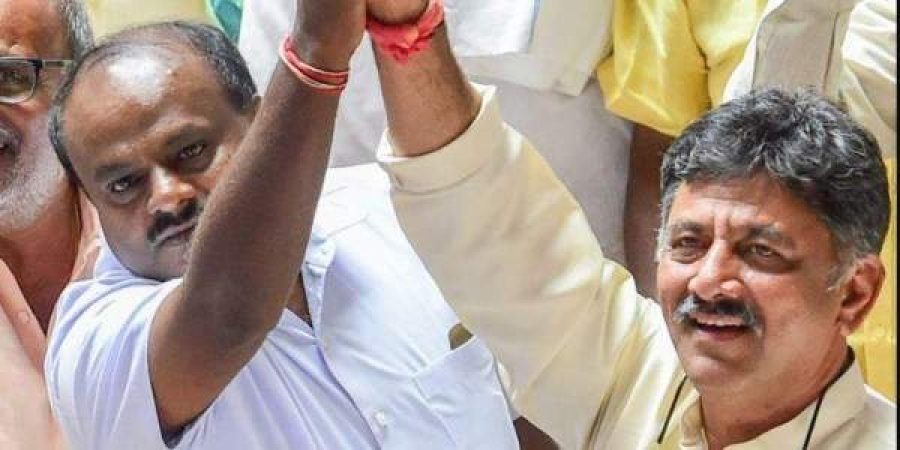
Karnataka stalemate points at immoral leaders, daft voters, ineffective laws

The ongoing political drama in the fittingly named state of Karnataka is a moment of deep shame for Indian democracy. The theatre of absurd, replete with themes of betrayal, treachery, greed and conspiracy, is exposing the ugly, dark side of India’s politics and the vile characters who have come to dominate it.
The theatrics point not only at the state of our polity. It also highlights the absence of effective laws to ensure the fundamental principles of a democracy are safeguarded, that the extant checks and rules can be easily violated. And, it is a compelling insight into the mind of the Indian voter, who has lost the ability to separate the wrong from the right, and is daft enough to reward those who need to be punished.
Also read: Governance comes to a standstill as political crisis grips Karnataka
In short, Karnataka is an antithesis to the very narrative of a democracy premised on ideology and the idea of greater public good. Stripped of its political spin, the drama in Karnataka is just about one thing: The pursuit of power; power at any cost. Taking advantage of the current arithmetic of the state assembly, morally decrepit legislators are swinging from one end of the political spectrum to another. Like pendulums separated from their moral, ethical axis, they are traversing a path of greed and unbridled ambition.
On offer, like in an open bid, are perks of power. For those, like Ramalinga Raju who are out of the coalition ministry, the bait is a portfolio. For those already in the ministry, the carrot is the prospect of a creamy portfolio. And for some, well, let’s just say they are always ready for what Don Vito Corleone famously called a “deal that he can’t resist.”
Also read: Here’s why K’taka speaker rejected resignations of 8 rebel MLAs
That the loyalty, morality and ideology — if the latter two even existed in the first place —can be easily co-opted is visible in the antics of two independent legislators who were just recently inducted as ministers in the Congress-JD(S) coalition government. Aware that the pendulum of majority is about to swing away from them, the two have oscillated towards the BJP.
Consider the disparate group of legislators willing to quit: Reddy is an influential Congress leader in Bengaluru city; two JD(S) legislators were till recently considered loyal to the Gowda family, another was the chief of its state unit; three Congress rebels were close to former chief minister Siddaramaiah. Then there are the independents with no legal compulsions for a long-term commitment. What’s bringing this group together?
The purpose of an election is to help people choose their representative. This selection is ideally based on the suitability of the candidate, their commitment to the ideology and the constituency they represent. The Karnataka legislators have turned this argument on the head — they now choose what is suitable for them.
The anti-defection law has, obviously, failed. As pointed out in an insightful critique of the law here (BJP may offer rebel K’taka MLAs cabinet berths, but Constitution doesn’t), the anti-defection law seems to have so many holes that a plane can fly through it. This is primarily because the law is not being implemented in letter and spirit because of the potential for discretionary use. Also, it is not acting as a deterrent because the risks of violating it are far lower than the rewards of changing loyalties.
The anti-defection law should ideally put a blanket life ban on any legislator who voluntarily quits the original party, violates its whip or tries to defect. The provision that allows a group to break away with a 2/3 rd majority also needs to be evaluated afresh, considering that some Assemblies have such low strength than mass defections become prone to carrots and sticks. For those who have been following the drama in Goa and before that Arunachal Pradesh and Telangana, this theory doesn’t require the burden of proof. The electorate is, of course, to be blamed. As pointed out by the Federal earlier, in 2019 February the Karnataka Speaker disqualified then Congress legislator from Chincholi, Umesh Jadhav for defecting to the BJP as per the 10 th schedule of the Constitution.
Also read: Karnataka crisis: Speaker douses fire, keeps BJP waiting longer
But, Jadhav became a member of the Lok Sabha after contesting the Gulbarga Lok Sabha seat on a BJP ticket. What could be more ironical than the fact that a disqualified MLA just needs to switch parties to enter the Lok Sabha, despite the 10 th schedule? For a democracy to survive, two things are sine qua non. One, fundamental principles aimed at the pursuit of public good and safeguards to protect them. Two, the presence of ethical, morally upright leaders and enlightened voters ready to reward the deserving and brutally punish those who flout the tenets of a fair electoral system.
The drama in Karnataka is a reminder of the absence of the conscientious leader, fool-proof safeguards and informed, judicious voters.


